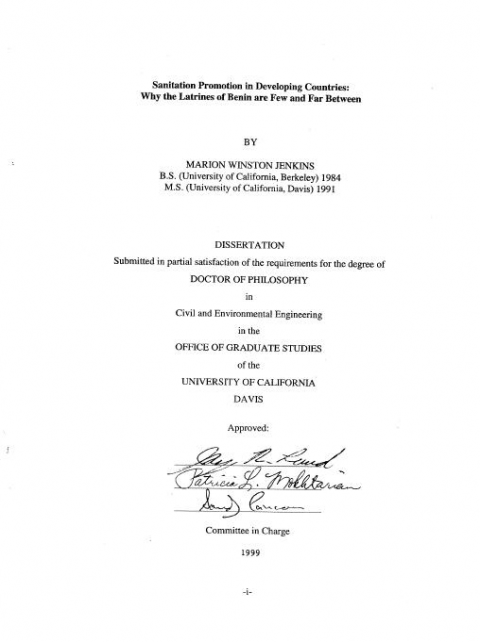Sanitation Promotion in Developing Countries - Why the Latrines of Benin are Few and Far Between
Jenkins, M.W. (1999)

Published in: 1999
Author:
Jenkins, M.W.
Uploaded by:
SuSanA secretariat
Partner profile:
common upload
5162 Views
61 Downloads
Content - Summary
This dissertation examines the decision of private households to install a pit latrine in rural Benin, West Africa. A conceptual framework for understanding sanitation choices in developing countries is derived from behavioral and consumer choice theories. Cultural foundations of consumption and defecation-related beliefs and behavior are integral parts of this explanatory framework.
Findings from a qualitative investigation of household behavior in rural Benin are synthesized to construct a schematic model of the decision to adopt a latrine. The model asserts that the key conditions for latrines to be chosen in rural Benin are the presence of at least one active drive or dissatisfaction from among the 11 found to motivate adoption (concerning prestige, well-being, and two particular situations), and the absence of constraints on adoption among 13 related to awareness, physical implementation, and psycho-social issues. Lifestyle and village environment influence the presence of drives.
Latrine adoption and other data for 520 villages in the study area are analyzed in models of village-level adoption to test hypotheses from the qualitative work about the factors that arouse desires for latrines. Village-level conditions and characteristics that stimulate demand for improved sanitation are identified.
Finally, data on the adoption behavior of 320 households are collected in a survey, analyzed, and used to develop regression and logit models of preference for latrines, stated intention to adopt, and observed choice to install a latrine. These models indicate that the most important motives for adoption are distance to open defecation and prestige,
in particular a desire to express new experiences and a new lifestyle acquired outside the village. The most important constraints are lack of finance, misunderstanding of latrines, and poor latrine design and performance. The research methodology and results have widespread implications for assessing sanitation demand and for developing demand-responsive and marketing approaches to promote improved sanitation in developing countries.
Additional information
Dissertation, University of California/Davis
Bibliographic information
Jenkins, M.W. (1999). Sanitation Promotion in Developing Countries - Why the Latrines of Benin are Few and Far Between.
Filter tags
English Rural Sub-Saharan Africa















